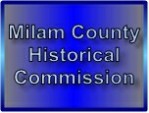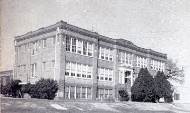Milam County Historical Commission
Milam County, Texas
Milam County, Texas






The Clark Brothers put great store in two things:
one was laughter; the other was Chips from
FIVE CORDS A DAY
By Edward A. Clark
Published in True West, September-October, 1967
THE SCENE opens on a frosty Christmas Eve morning in December, 1895 at McCauley’s
Saloon, Rockdale, Texas. This time and place is chosen, for it was there and only there
that you might catch Tex, Joe, Jim, Ed and Will Clark together - not exactly together,
but in the same crowd.
Today, and even then, workers and public speakers refer to the “strong, silent men of
the great open spaces”; these Clark brothers were of that tradition, silence was their
code. Take the silence between Joe and his father-in-law; it lasted for forty-five
years until Jim Rolston’s death. This also explains the brothers’ distant attitude
toward each other. Stubbornness was not involved; it was their code.
One description fits all the brothers. Tex, the oldest, stood 6 feet 4 inches down to
Will, the youngest, who was 6 feet, 2 inches. Gangling, stoop-shouldered, all had
reddish, leathery faces, untrimmed mustaches of the handlebar type, wide-brimmed
Stetson hats and clean baggy suits of jeans, hanging on them with clothesline effect.
They had driven their families into town in wagons drawn by mules. The hard-worked oxen
were left at home to rest. The wives and children were left at Scarbrough & Hicks.
Each wife had a long list of dry goods, groceries and other supplies and were buying
enough to last the coming twelve months. These wives grew very accurate on buying that
far in advance. Will’s wife, Lula, boasted that she had only a tablespoonful of baking
powder left over; Evie, Joe’s wife, said that she had run so close on soda that she
hadn’t had any in the bread for two weeks. Mollie, Tex’s wife, remarked that she was
ashamed of how she messed up her calculations.
“It worried me to death,” she said. “I’d bought everything for one baby but twins
showed up. Tex didn’t get mad. He just put his gallon jug in the wagon when he left
on the extra trip to town.”
On this particular Christmas Eve morning my father, Joe Clark, took me along to
McCauley’s Saloon. Mother couldn’t manage me and the buying, too; I was seven. We
entered the saloon half frozen. Jim and Ed, who were not married then, were already
there, seated near a huge red-hot stove. Joe rushed up to the bar, greeted McCauley,
then turned and with a sweep of his hand ordered all up for drinks. Jim and Ed finally
ambled over to the bar at different places in the line. While McCauley was ladling out
hot Tom and Jerries from a five-gallon crock, Tex and Will entered and found a place in
line. We have all five now with their feet on the rail.
These few hours spent at McCauley’s Saloon once a year was the extent of their vacation
away from hard work. They never drank in excess and who would wish to deny them this
small recreation? As they finished their drinks they would amble back to their chairs,
and none of them had paid much attention to the other. They spent the time in being
spoken to by new arrivals at the saloon; one or the other would leave for a while then
return.
Then when things began to lag, Tex would start to tell a yarn. This woke the folks up
like an electric shock. They would gang in close to Tex, some of them shaking hands.
Tex would finish with a great roar of laughter from all, even McCauley. The story was
of race horses and women (flavor--smutty).
Then for hours it was tale after tale; silence was turned to laughter, everything ended
with a joke.
At a time when the five brothers were about the only customers in the saloon, Jim said,
“Let’s slide over to the bar, boys. I believe we can stick old Mac for the drinks.” (I
think I saw him give Tex a sly wink.)
McCauley was wiping the polished bar in front of Jim. Jim said, “Mac, you old horse
thief, we want you in on this game; and the point is, if any of us ask a question and
someone can answer it, the man asking the question has to buy drinks for all. If nobody
can answer the question everyone has to buy the questioner a drink, provided he can
answer his own question.”
Tex spoke up and asked, “How is it that a prairie dog can dig a hole fifty feet and
leave no dirt on the outside?”
They all gave up, so it was up to Tex to answer his own question or buy the drinks.
“The prairie dog don’t leave any dirt on the outside,” Tex said, “because he starts at
the bottom and digs up.”
McCauley snorted. “How does the prairie dog get down there to start digging?”
“Ah!” said Tex, “that’s your question. Now you answer it.”
McCauley cheerfully set out the drinks, including my fourth bottle of lemon soda.
Shortly after this round of drinks, word was sent down by children that the coming
year’s supplies had been bought, paid for, and were ready to be loaded in the wagons.
This information cast a gloom over Tex, Joe and Will.
Tex left, but not alone. He had the big brown gallon jug in hand. Joe had his half-
gallon jug. And Will left with a half-pint bottle hid in each pocket. He said his wife
Lula didn’t like the smell of it but had no objections to a little ol’ half-pint.This
brought to an end the day at McCauley’s Saloon.
FOR OVER forty years I made an effort at various times to learn something of the family
history of the Clark brothers, something about their and my ancestors. For example, I
asked Joe, my father, what his mother’s maiden name was. He said it was Vaughn. A year
of so later I asked him the same question again. He then told me her maiden name was
Scott. I later asked Ed and he said his mother’s maiden name was Smith; a little
later, Jim told me it was Moore. Will said his mother’s name before her marriage was
Jones. I then braced my courage and asked Tex, thinking perhaps I would get somewhere.
He said her maiden name was Sparks.
I then asked him if Grandpa Clark, his father, was married five times? “Hell no,” he
said, and wanted to know why I asked such a question. I told him that Joe, Jim, Ed and
Will and himself had all given me different names.
“Well,” he said, “that ought to learn you a lesson – learn you not to be asking
questions.” He continued, saying that once out on the Pecos River, at Horsehead
Crossing, he saw a man in a cow-camp get shot dead just because he asked too many
questions. (Joe had told me no less than fifty times about this man being shot dead at
Horsehead Crossing on the Pecos for asking too many questions.)
I got to be more of less skeptical of my ancestors; however it was hard to picture the
forefathers of the Clark brothers as not being honest and upright in all respects,
otherwise Tex, Joe, Jim, Ed and Will could not have shown their high purpose in
life—couldn’t each of them cut five cords of wood in one day? What better record
would you want? Five cords was three days’ work for the average sort of man.
The hardest day’s work I have done to date was when I started out one time to cut five
cords of wood. I was seventeen years old and strong as a bull. I took off less than
ten minutes for lunch, which we had brought with us.
Joe had stacked his five cords of wood shortly before sundown. He walked over where I
was chopping and said, laughing, “Too many chips.” He helped me rick (stack) my wood,
and it measured a fourth shy of being one full cord.
While stacking up, he said “You’ve cut out enough chips here to make you full ten cords
of wood. I didn’t know if you was fighting fire over here or cutting wood. Too many
chips! Too many chips! You got to look where you hit and hit where you look. Make
every lick with the ax count; that’s why a cross-eyed man ain’t much at chopping wood.”
I replied, “Yes, and if there is a next time, I won’t start in on a blackjack tree,
either.”
“Well,” Joe advised, “if you cut wood every day like you have today, for five or six
years, you might learn to cut a couple of cords a day.” That’s what he thought of my
ability. And it can be added that this standard of perfection extended to all types of
woodworking, ship-building, cabinet and casket making, designings, etc. So it would
seem absurd to become skeptical of these upright, hard-working men.
THE WORD of each was his bond. None of them was a thief except Joe—he stole his wife.
He swiped Evie from her father, Jim Rolston, who was also the strong, silent type. The
fact, as already stated, that these two men did not speak to each other again in life
over a period of forty-five years was proof of their strength in that rugged tradition.
After some research, inquiry and investigation, I wish to disclose the outstanding fact
that James R. Rolston, the father-in-law, and Joseph S. Clark, the son-in-law, hold the
world’s record for father-in-law-son-in-law non-speaking. They are over twenty years
ahead and I doubt if their record will ever be equaled.
These two men worked so hard at not speaking, I have seen them on the street of
Thorndale, standing and talking to the same stranger for four hours, merely using the
stranger as a go-between to carry on their conversation. If the poor stranger became
restless and wanted to leave, one or the other would grab him by the arm and start
telling him a dirty joke. Hell and high water may come; hell and high water may go;
these two had their reputation for not speaking to maintain. They would not speak—for
to speak would be dishonest and disloyal to each other.
Jim Rolston, upon learning that Evie, his sixteen-year-old daughter, had eloped with
Joe, reached up over the fireplace and brought down a double barrel shotgun, loaded
with buckshot. He saddled Old Paint, and rode in pursuit.
How Evie kept Joe hid the next few months is easy to explain. Joe was a man who looked
ahead, He had built his house at the edge of a thirty-acre thicket of chaparral
bushes, and this thicket was matted and almost too thick to crawl through.
After his father-in-law had almost ridden up on him at the house, which caused him to
tear a path halfway through the thicket, he told Evie he had intended to clear the
thicket out anyway, so he would start to work out from the center of it and keep
clearing it in a circle until he got it ready for the plow. He also said that in order
to have it ready for planting that season, he would be forced to start work before
daybreak and work until sundown. He would be so rushed he would have to carry his
lunch to work mornings. And before leaving with his pick and ax next morning he
cautioned Evie, “Now, in case you have to come out there, you be blame shore nobody is
following you. I don’t want to get in any more blame traps. ‘Bout as soon get shot as
to have to run through that thicket again.”
In a few weeks Evie had established grapevine connections through her brothers, Tom and
Math, and sisters, Sallie and Bell. They kept her informed of the direction their
father had gone. They were just children, seven to fourteen years old. One day, one
of them came over and reported, “Paw left his gun home today. He came home last night
all excited. He said he saw Joe coming down the road about a quarter-mile off. He
slipped his horse in the brush at the side of the road and waited with his gun in the
forks of a tree to get good aim, with both hammers cocked.
”’Joe walked by,‘ Paw said, ‘and just as he got even with me twenty steps or so out in
the road and I was pulling the triggers, Great God Almighty, then I saw it was Jim.’
He said he just trembled all over to think that he nearly killed the best friend he had
in the world.”
Sally had spoken up then and said, “Paw, you used to feel the same about Joe.”
“’You are right, daughter. I guess I’m a fool. Anyway, I got a letter today your Uncle
John is down sick. Matthew, you and Tom start this morning. Get the bows and
wagonsheet on that wagon ‘cause we’re heading west Monday morning. You girls pack up
the bedding, groceries and things and be sure and get the gun in the wagon.’
“Now Evie,” Sally said, “you must go home with us and stay overnight until we leave.
It will make Paw feel better.”
Evie said she sure “felt sorry for Paw” when she told him goodbye that Monday morning.
But that ended the double barrel shotgun days to Joe’s life. However, he finished the
grubbing and clearing of the thicket on time and, with two yokes of oxen, the sod was
broken and a good crop was made on the thirty acres.
Joe told me that one time Jim sold a note or something, and it was necessary that he
sign the paper before a notary public. The nearest notary was at Cameron or Lexington,
both about the same distance away. Cameron was a little closer but crossing the San
Gabriel and Little River had to be considered and caused Jim to choose going to
Lexington.
Joe suggested he take a horse and ride, but Jim said Hell no, that it was only nineteen
miles straight through the woods, and forty miles by road, so he would walk. He arrived
in Lexington to find that the notary public lived seven miles farther on, so he walked
on out to the farm house as directed. Arriving there, he saw a man plowing in the
filed, but rather than walk over the plowed ground he yelled “Hello” in front of the
house. When a lady appeared at the door, he asked her if her husband was a notary
public?
She said, “No, he is a Democrat.”
Jim said this made him so damn mad that he wheeled and was going to head for Cameron,
but about that time an older lady came to the door and got his paper fixed up.
I was always struck by the fact the mother’s side of the family had over 5,000
relatives against the Clarks’ having 5 –great odds, you must admit. Take, for example,
my great-grandfather, Matthew McClanahan Cornwallis Rolston. He had over 4,000 acres of
land in the home ranch, roughly cornering at Nile, Gay Hill and Salty. He was a giant
in stature, 6 feet 6 inches tall, with shoulders wide as a door. He wore a Stetson hat
with a brim almost big enough to cover the 4,000 acres. He had nine fine sons and nine
fine daughters. The old man’s eyesight began to fail, and when the nine sons brought
in nine beautiful and flashy brides, hooped and bustle-skirted, Great Grandpa lost his
eyesight entirely.
He was born in Ireland, County Galway, at Cow Crossing, west fork of the River Shannon.
Some city police department lost a good man when they failed to get him on the force.
Tracing an ancestor back to Ireland is far enough. We can assume that he was a horse
thief, and let it go at that.
I was about ten when he passed on to his reward at the age of ninety-three. About half
of his many sons and daughters moved to and located around Long Mountain, fourteen
miles west of Mason, Texas and were scattered from there on west to Rocksprings.
Jim Rolston, Joe’s father-in-law, was his eldest son, and made annual visits to his
relatives in the West. He wore a long black beard, high boots and to see him on a horse
at breakneck speed after a cow, it was hard to tell if it was him, Buffalo Bill, Sam
Bass or Cole Younger. He always like to tell of his last Indian fight, which took place
on Packsaddle Mountain a few miles east of Llano in 1871. He and his family happened to
be passing on one of his annual trips west, just at a time when the Indians were making
one of their last stands.
He said when he arrived and took charge, only three white men were alive; the others
lay dead. He would always ignore my questions when I would ask how many wild Indians he
killed in that battle.
However, his wife, Elizabeth, had a little different version of the fight. She said
when they reached Burnet and learned of the Indian battle, they detoured thirty-two
miles around Packsaddle. She said he did make four killings though—three cottontails
and one squirrel.
Tex and Joe Clark often discussed their relatives, usually while sitting in a squatting
position out behind the barn. Being busy morning, noon and night, little time was had
for conversation. I listened in when I could. I heard Tex say to Joe, “Grandpaw told me
that Uncle John would always have to have his dollar, and they paid it out or the dead
revenue agent’s pocket.” This puzzled me.
Then some years later a grizzled ex-Texas Ranger told me this yarn that his grandfather
had told him, and that old overheard conversation made more sense. A revenue agent
called at a small house on the side of a mountain and only a boy about ten years of age
was home. The following conversation took place.
“Where is your father?”
“Paw’s at the still.”
“Where is your mother/”
“Maw’s at the still.”
“Where are your brothers and sisters?”
“They’re at the still.”
“I’ll give you a dollar to take me to the still.”
“Gimme the dollar.”
“I’ll give it to you when I get back.”
“Mister, you ain’t coming back.”
Now surely this couldn’t have happened in the Clark family; however, if I had to choose
between cutting wood or bootlegging, you can give me respectability or give me
disgrace, just so it’s not five cords a day.
.
Published in
TRUE WEST
Published by J. Marvin Hunter
September-October, 1967
TRUE WEST
Published by J. Marvin Hunter
September-October, 1967